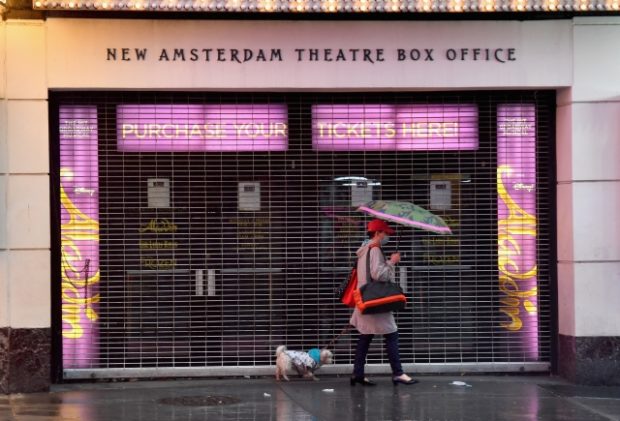Stages sit dark as US performance world struggles with canceled seasons

People walk past a closed broadway theater near Time Square on Oct. 12, 2020 in New York City. Image: AFP/Angela Weiss.
Recent weeks have seen the already painful situation facing live performance in the United States grow increasingly dire, with major companies along with Broadway somberly scrapping hope to reopen before next summer and scrambling to find ways to stay in the public eye.
New York’s Metropolitan Opera was the first top outfit to cancel its entire 2020-21 season over the COVID-19 pandemic, followed by the highly bankable Broadway theater district and the city’s famed Philharmonic symphony.
Across the nation company directors are facing similar decisions, with the Boston Symphony Orchestra following the lead of its New York neighbors.
Elsewhere, many organizations are still aiming to open in January 2021 as they pilot ways to stay fresh and avoid falling into the red, but the future appears grim.
Many companies have already budgeted for a season sans spectators in a country where the COVID-19 caseload continues to add about 40,000 new infections daily.
Seattle anticipates a loss of $6 million (P291.4 million) in revenue, as New York’s Philharmonic estimates to lose $20 million (P971.3 million) and the Philadelphia Orchestra more than $25 million (P1.2 billion).
“I always have hope, but I think it is going to be very unlikely we’re going to do anything in front of live audiences anytime soon,” said Matias Tarnopolsky, the director in Philadelphia.
The pandemic has forced layoffs, furloughs and pay cuts across the performing arts, as organizations including the Phil and the Met are bargaining with unions to adapt musicians’ contracts to the financial challenges of the moment.
Government subsidies are not the norm for American orchestras and operas, which rely on donations, wealthy patrons and, to a smaller extent, ticket sales to pay bills and keep endowments robust.
“If the fundraising holds we should be able to make it to the summer, but we still have a very large fundraising goal,” said Kristina Murti, the Seattle Opera’s communications head. “It’s always stressful to raise a lot of money,” she said, especially in an already gloomy economy.
Join the circus
But companies have by no means given up on offering content, most of it virtual, some of it free and all of it breaking new ground.
The Atlanta Opera, which months ago canceled its 2019-20 season and postponed the following performance slate by a full year, has devised a unique fall series that will see live performances of “Pagliacci” and “The Kaiser of Atlantis” under a circus tent on a baseball field starting Oct. 22.
Tickets in the southern city will be sold as four-person socially distanced “pods,” welcoming up to 240 people per show. Singers will perform behind plexiglass or wear face coverings and all patrons must wear masks and get temperature checks.
Tomer Zvulun, the Atlanta Opera’s general and artistic director, said the company has already sold nearly $100,000 in tickets.
But he emphasized the move was less about money — in April the company slashed its $10 million budget (around P485.6 million) by 34 percent and like everyone else, anticipates losses — and more about adapting their art to a society in distress.
“As artists we are nimble enough, we are desperate enough, we are committed enough to find a way to do what we do best and connect with a community,” he said. “We all are very grateful for those handheld devices and TVs, but there is no replacement for live performance.”
‘Waiting for a miracle’
The New York Philharmonic launched an outdoor “Bandwagon” series with small ensembles playing on city street corners, as the Los Angeles Opera showcased its singers lulling their own children to sleep with bedtime songs.
Tarnopolsky sees silver linings in the struggle, saying virtual content additions “are changes that will last far beyond the current pandemic and be part of the orchestra’s offering forever.”
Still, fewer shows and reduced rehearsals has been tough on musicians themselves who are grappling with salary cuts and limited modes to cultivate their art.
“I have a lot of concern about musicians leaving the field because the situation is so difficult,” said Simon Woods, head of the League of American Orchestras which represents some 700 organizations.
Maxim Moston, a violinist who regularly performed on Broadway, most recently for the musical “Moulin Rouge,” is worried about New York’s future as an artistic nerve center.
“People can’t afford to pay New York City rents while sitting around and waiting for it to be safe for them to practice their professions and their passions,” he said.
His family owns their apartment which provides some relief, but at a certain point enough might prove enough.
“I think that many of us, myself included, haven’t truly faced that reality yet,” Moston said. “I’m hanging on, waiting for a miracle to come.” CC
RELATED STORIES:
The lives of musicians in the Philippines, amid a pandemic